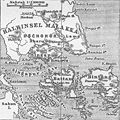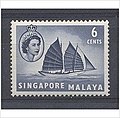Portal:Singapore
 Map of Singapore Singapore, officially the Republic of Singapore, is an island country and city-state in maritime Southeast Asia. It is about one degree of latitude (137 kilometres or 85 miles) north of the equator, off the southern tip of the Malay Peninsula, bordering the Strait of Malacca to the west, the Singapore Strait to the south along with the Riau Islands in Indonesia, the South China Sea to the east, and the Straits of Johor along with the State of Johor in Malaysia to the north. The country's territory comprises one main island, 63 satellite islands and islets, and one outlying islet; the combined area of these has increased by approximately 25% since the country's independence as a result of extensive land reclamation projects. It has the third highest population density of any country in the world, although there are numerous green and recreational spaces as a result of urban planning. With a multicultural population and in recognition of the cultural identities of the major ethnic groups within the nation, Singapore has four official languages: English, Malay, Mandarin, and Tamil. English is the common language, with exclusive use in numerous public services. Multi-racialism is enshrined in the constitution and continues to shape national policies in education, housing, and politics.
Singapore's history dates back at least eight hundred years, having been a maritime emporium known as Temasek and subsequently a major constituent part of several successive thalassocratic empires. Its contemporary era began in 1819, when Stamford Raffles established Singapore as an entrepôt trading post of the British Empire. In 1867, Singapore came under the direct control of Britain as part of the Straits Settlements. During World War II, Singapore was occupied by Japan in 1942 and returned to British control as a separate Crown colony following Japan's surrender in 1945. Singapore gained self-governance in 1959 and, in 1963, became part of the new federation of Malaysia, alongside Malaya, North Borneo, and Sarawak. Ideological differences led to Singapore's expulsion from the federation two years later; Singapore became an independent sovereign country in 1965. After early years of turbulence and despite lacking natural resources and a hinterland, the nation rapidly developed to become one of the Four Asian Tigers. With its growth based on international trade and economic globalisation, it integrated itself with the world economy through free trade with minimal trade barriers and tariffs, export-oriented industrialisation, and the large accumulation of received foreign direct investments, foreign exchange reserves, and assets held by sovereign wealth funds. As a highly developed country, it has one of the highest GDP per capita (PPP) in the world. Identified as a tax haven, Singapore is the only country in Asia with a AAA sovereign credit rating from all major rating agencies. It is a major aviation, financial, and maritime shipping hub and has consistently been ranked as one of the most expensive cities to live in for expatriates and foreign workers. Singapore ranks highly in key social indicators: education, healthcare, quality of life, personal safety, infrastructure, and housing, with a home-ownership rate of 88 percent. Singaporeans enjoy one of the longest life expectancies, fastest Internet connection speeds, lowest infant mortality rates, and lowest levels of corruption in the world. Singapore is a parliamentary republic in the Westminster tradition of unicameral parliamentary government, and its legal system is based on common law. While the country is de jure a multi-party democracy with free elections, the government under the People's Action Party (PAP) wields widespread control and political dominance. The PAP has governed the country continuously since full internal self-government was achieved in 1959, and holds a supermajority in Parliament. One of the five founding members of ASEAN, Singapore is also the headquarters of the Asia-Pacific Economic Cooperation Secretariat, the Pacific Economic Cooperation Council Secretariat, and is the host city of many international conferences and events. Singapore is also a member of the United Nations, the World Trade Organization, the East Asia Summit, the Non-Aligned Movement, and the Commonwealth of Nations. (Full article...)Selected article - There are three general sources of Singapore law: legislation, judicial precedents (case law), and custom. Legislation is divided into statutes and subsidiary legislation. Statutes are written laws enacted by the Singapore Parliament, as well as by other bodies that had power to pass laws for Singapore in the past. Statutes enacted by these other bodies may still be in force if they have not been repealed. One particularly important statute is the Constitution of the Republic of Singapore, which is the supreme law of Singapore. Any law the Legislature enacts after the commencement of the Constitution that is inconsistent with it is, to the extent of the inconsistency, void. Subsidiary legislation, also known as "delegated legislation" or "subordinate legislation", is written law made by ministers or other administrative agencies such as government departments and statutory boards under the authority of a statute (often called its "parent Act") or other lawful authority, and not directly by Parliament. (Full article...)Selected pictureThe Tanglin Police Division (or 'E' Division, Chinese: 东陵警区) is a police division of the Singapore Police Force. It manages a varied, highly urbanised area of central Singapore, which includes the public housing towns of Bishan, Toa Payoh and parts of Kallang, large areas of private housing areas such as those in Bukit Timah and Novena, as well as key commercial areas such as Orchard Road and Clarke Quay. Read more... General imagesThe following are images from various Singapore-related articles on Wikipedia.
Selected biography - Denise Phua Lay Peng (Chinese: 潘丽萍; pinyin: Pān Lìpíng; born 9 December 1959) is a Singaporean politician who has been serving as Mayor of Central Singapore District since 2014. A member of the governing People's Action Party (PAP), she has been the Member of Parliament (MP) representing the Kampong Glam division of Jalan Besar GRC since 2015. Prior to entering politics, she is a full-time special needs volunteer after working in the private sector for two decades. She became the president of the Autism Resource Centre and co-founded Pathlight School. (Full article...)Did you know (auto-generated)
In this month
More did you know -
Selected panoramaTanjong Chek Jawa (or Tanjung Chek Jawa or simply Chek Jawa; Chinese: 仄爪哇) is a cape and the name of its 100-hectare wetlands located on the south-eastern tip of Pulau Ubin, an island off the north-eastern coast of the main island of Singapore. Singapore topicsRelated portalsSoutheast Asia Other Countries Tasks
CategoriesWikiprojectsAssociated WikimediaThe following Wikimedia Foundation sister projects provide more on this subject:
Discover Wikipedia using portals |






























































